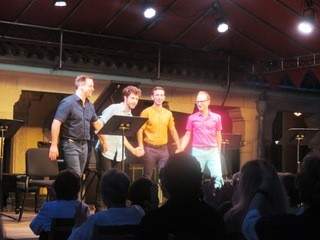|
Back
Mystery Plays, Mystery Music New York
Katonah (Caramoor Center for Music and the Arts, Spanish Courtyard)
07/25/2019 -
“Veils of Desire”
Benjamin Britten: Canticle II “Abraham and Isaac”, Opus 51 – “Sonetto XXX: Veggio co’ bei vostri occhi un dolce lume” from Seven Sonnets of Michelangelo, Opus 22
Claudio Monteverdi: “Possente spirto” from L’Orfeo – “Oblivion soave” from L’incoronazione di Poppea
Matthew Aucoin: Selections from Eurydice – “Tony: Ending the Life” from Merrill Songs
Johann Sebastian Bach: “Mein Jesu, ziehe mich nach dir” from St. Matthew Passion, BWV 244
American Modern Opera Company: Anthony Roth Costanzo (Countertenor), Paul Appleby (Tenor), Matthew Aucoin (Pianist), Wayne Koestenbaum (Narrator)

P. Appleby, M. Aucoin, A.R. Costanzo, W. Koestenbaum
(© Samuel A. Dog)
“The principal passions of the soul are anger, serenity and humility. The best philosophers affirm this, the very nature of our voice–high, low and middle–shows it. The art of music clearly manifests it in these three terms: agitated, soft and moderate. For the end of all good music is to affect the soul.””
Claudio Monteverdi (1567-1643)
The latest production of American Modern Opera Company was neither American nor Modern, and it certainly wasn’t Opera. Rather, the three musicians on the stage of Caramoor’s gorgeous Spanish Courtyard presented a singular opus which–by dint ofselection and execution–plunged us into that Monteverdi soul.
Defining “Veils for Desire”, one might use Hector Berlioz’ Lélio as a template, albeit without offstage chorus or orchestra, only a single piano, two singers and a narrator. Berlioz’ narrator was timeless because he ceaselessly yearned for the One who was unobtainable. The narrator in “Veils for Desire”, actor/writer Wayne Koestenbaum, has nowhere near those opium visions. In his colloquial meditations between music, he does refer to being “spaced out”, refers to childhood memories, to Judy Garland and–obliquely–to the music which is to come.
I am certain that Mr. Koestenbaum was impressive to some. Yet for this listener, the songs chosen for “Veils of Desire” were so singular, so remarkable in the juxtaposition of words and eras, that mere narration became a disconcerting (pun intended) suspension of our so welcome disbelief.
Matthew Aucoin was not only the graceful, elegant pianist, but the composer for the 21st Century music. So I assume he chose the works played here. And by leapfrogging over the usual 18th and 19th Century old favorites, by alternating music that bounded from the emotional pleas of Monteverdi to Benjamin Britten’s setting of Medieval poems and dramas, he made our own spirits leap.
Not leap in joy, but from eon to eon. This was early Benjamin Britten taking the 12th Century mystery play of Abraham and Isaac–with Job, the most puzzling chapter of a sadistic, torturing, insane God. And yet the piano music was a series of rainbow arpeggios. As if Britten’s God (and the original Medieval God) was a devilish old fella, a Guy who not only speaks to people but plays odd games with them.
This was followed with one of the two Eurydice pieces, with the earliest extant opera by Monteverdi. Yes, it was super-emotional, yet it hid even more complexities in its music. After all, with Mozart and Bach and perhaps Webern, Monteverdi escapes from a “period” a historical figure, and transcends centuries.
That, with one of his later “immoral” melodies from Poppea, Monteverdi yesterday afternoon showed another aspect of a weird God. A God who says, “Go ahead, make love with the girl. It’s an immaculate conception.”
Now more Benjamin Britten, one of the Michelangelo Sonnets, “I see through your lovely eyes a sweet light”. Shostakovich set some of the same poems. But Britten, writing Michelangelo’s homoerotic verses for his own lover Peter Pears, had his own “beyond the veil” motivations for setting them.
Strangely, the Bach selection from St. Matthew Passion (“I want to watch over my Jesus”) sounded pedestrian. The words were “veil-seeking” erotic for God, but the melody was strophic, plain, ordinary, part of...well, part of the Baroque instead of his own singularity.
Finally we had pianist Matthew Aucoin’s verses for Orpheus (a chatty letter to Eurydice in Hades, where possibly a worm may find them) and one of James Merrill’s long complex poems. I confess that this was my first exposure to Mr. Aucoin’s compositions, but they were as lyrical, as percussive when necessary and as natural as his own performances.
The two singers were amazing. Anthony Roth Costanzo’s countertenor voice was never (that horrible word), virtuosic. The singing was as natural as possible. And with the final Monteverdi aria, where Nero serenades Poppea, it was as elegiac, gentle, almost sexlessly seductive. A beautiful ending to the concert.
Paul Appleby is equally remarkable for the artlessness of his range. Starting in the duet between Abraham and Issac at the top of his range, lowering it down, and again raising it for the dual-vocalization when God tells Abraham not to sacrifice his child.
“Hey,” (I paraphrase Jehovah in His own Divine Comedy), “can’t ya take a joke”?
One doesn’t want to downgrade Wayne Koestenbaum’s writing and narrative talents. But where Mr. Aucoin became his notes, and where Appleby and Costanzo became their music, Mr. Koestenbaum was never turned into another figure. He was us, perhaps. The musicians took listeners behind the veil of scribbles and keys to become something unknowable and often ineffable.
A special word for the fifth voice here, that of an unseen bullfrog in the Spanish Courtyard. Its voice was insistent, off-key, but became part of our own natures. The artists, the frog, and a lone firefly hopelessly yearning for a mate (like Orfeo and Poppea and Michelangelo) completed this outstanding coalescence of mystery, and the original definition of inspiration.
Harry Rolnick
|